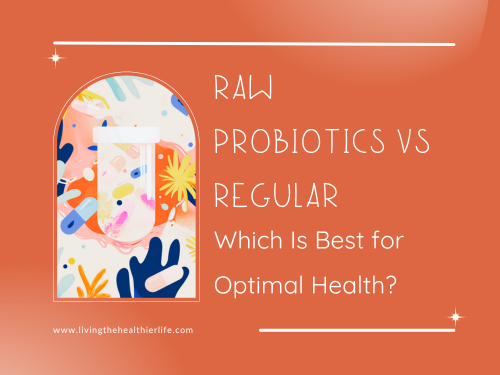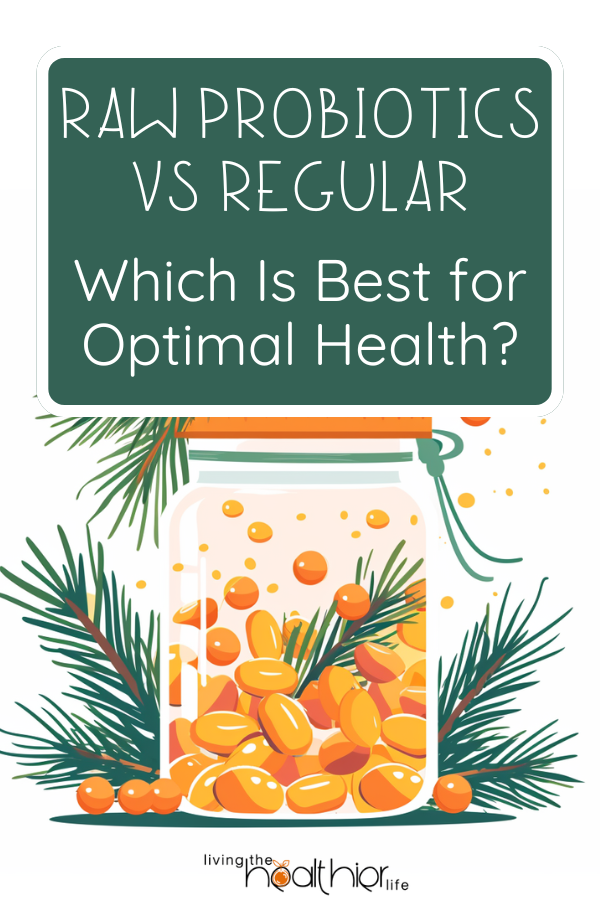Are you caught in the dilemma of choosing between raw probiotics and regular ones? With so many options on the market, deciding which is best for your health can feel overwhelming. In this detailed guide, we’ll delve deep into the comparison of raw probiotics vs regular to help you understand not just the differences, but which type could be the optimal choice for your unique health needs. Get ready to uncover all the facts you need to make an informed decision.
Disclaimer: This article contains affiliate links, which means we receive compensation if you buy after clicking on our links.

Understanding Raw vs. Regular Probiotics
Curious about the difference between raw and regular probiotics when it comes to gut health? Let’s break down what sets these two apart and why it might matter to you.
Raw Probiotics: What Exactly Are They?
Raw probiotics are the less tampered versions of good bacteria, usually found in fermented foods or as minimally processed supplements. Unlike their regular counterparts, which are often freeze-dried and encapsulated, raw probiotics come in a more natural state, retaining the original cultures of the food they came from. This means they could contain a diverse range of healthy bacteria, potentially offering a broader scope of health benefits. They are perfect for anyone looking to get as close to nature as possible while still reaping the perks of probiotics.
Regular Probiotics: What Makes Them Different?
Wondering how regular probiotics stand out? Well, these are the types you’ll usually find in dietary supplements or engineered into foods at your local supermarket. They’re crafted for consistency—each pill, yogurt, or fortified snack delivers a precise dose of probiotics aimed to support things like your digestive balance or immune health. Unlike raw probiotics that come straight from naturally fermented foods, regular probiotics go through a process to ensure they have a longer shelf life and are effective in your gut. So, if you’re looking for specific health benefits and value convenience, regular probiotics might be just what you need.
Understanding the Benefits
Both raw and regular probiotics have plenty of beneficial effects. Let’s take a closer look at how each type can uniquely enhance your health.
Why Consider Raw Probiotics? The Perks Explained
Raw probiotics come directly from their natural sources like kefir or sauerkraut, bringing a wide variety of unprocessed bacteria into your diet. This diversity not only boosts your gut flora but also supports your digestive system and immune health more broadly, which is important if you have existing health issues. Because they’re less processed, raw probiotics might also retain more natural enzymes and nutrients, which can further aid your digestive health. Plus, they are often nutrient-dense, making them good additions to your diet if you are aiming for weight loss.
The Upside of Regular Probiotics: Why They Might Be Better
Regular probiotics offer a more targeted approach to gut health. You’ll find them pre-packaged in foods or as probiotic supplements, each providing specific strains of beneficial bacteria. The advantage here is consistency; you know exactly what strains of probiotics you’re getting, and there’s no guesswork involved in achieving the right bacterial balance. This makes regular probiotics a convenient and reliable choice for supporting specific health needs effectively.
How Well Do Probiotics Work? Comparing Raw Vs Regular
Do different types of probiotics actually help improve your health? Let’s examine how raw and regular probiotics compare in effectiveness and their journey through the digestive system.
Do They Really Work? Comparing Their Impact on Your Health
Both raw and regular probiotics promise to boost your well-being, but how they do it can vary. Regular probiotics, found in supplements or fortified foods, deliver specific good bacteria aimed at targeted health benefits, like supporting your immune system or aiding digestion. Raw probiotics, found naturally in foods like yogurt and sauerkraut, offer a variety of bacteria that can contribute to overall gut health, potentially enhancing your body’s natural functions.
Making It Through the Stomach: Which Survives Better?
It’s not just what probiotics you take but whether they make it through your stomach acid that counts. Regular probiotics are often designed to withstand the stomach’s environment, ensuring they reach your gut where they can be most effective. Raw probiotics, though packed with a diverse array of bacteria, might struggle more to survive the journey unless they’re taken as part of a meal that helps buffer the stomach acid. So, if you’re focusing on gut health, you might want to consider how well your choice withstands the digestive trip.
Weighing the Pros and Cons
Even though probiotics come packed with benefits, there are always downsides to any decision. Let’s look to see some of the disadvantages you should know.
Thinking About Raw Probiotics? Here’s What to Watch Out For
Considering raw probiotics from sources like Eastern European wild kefir? They’re fantastic for bringing a rich variety of live bacteria right into your diet, enhancing your gut’s flora diversity. But keep in mind, since they come straight from nature without much processing or cold storage, their strength can vary quite a bit. Plus, making it through the tough environment of your gastrointestinal tract might be a challenge, which could dial down their effectiveness.
The Downsides of Regular Probiotics: What You Need to Know
On the flip side, regular probiotics, especially those high-potency formulas you find in capsules, are super consistent. They’re tailored to meet specific health needs, like boosting your immune system or helping your digestive function. However, they might not offer the same broad range of bacteria that whole food probiotics do, and for some people, the extra ingredients in these capsules can cause a bit of stomach upset. So, while they’re reliable, they might not suit everyone, especially if you’re sensitive to additives.
Making the Right Choice
Choosing between raw and regular probiotics isn’t just about what’s available—it’s about what’s right for you and your unique health needs. Let’s explore how to decide which probiotic could give you the most benefit.
Which Probiotic is Right for You?
Deciding on the right probiotic starts with understanding your health goals. Are you looking to boost your immune system health or manage gastrointestinal issues? Regular probiotics, often available as high-potency raw probiotics formulas in probiotic capsules, are great if you need something specific, like support for gut bacteria or managing irritable bowel syndrome. These products are backed by clinical trials, giving you peace of mind that they’re effective. On the other hand, if you’re after general well-being and prefer a natural approach, whole food probiotics might be up your alley, offering a broad spectrum of benefits and diverse probiotic strains.
Finding Your Fit: Lifestyle and Probiotic Choices
Your daily routine and lifestyle also play a crucial role in choosing the right probiotic. If you’re always on the go, you might appreciate the convenience of probiotic capsules that don’t require refrigeration and can be easily integrated into your busy life. However, if you’re keen on natural sources and have a bit more time to dedicate to your health regimen, integrating foods enriched with wild European kefir grains or a unique line of high-potency, mainly Bulgarian yogurt concentrate might suit you better. Always consider how a probiotic product fits into your lifestyle, not just your medicine cabinet, to make the most out of its benefits.
Tips for Using Probiotics
Integrating probiotics into your daily life doesn’t have to be complicated. Let’s look at some straightforward ways to make sure you’re getting the most from these beneficial bacteria every day.
How to Easily Add Probiotics to Your Daily Routine
Adding probiotics to your routine can be as simple as choosing the right foods or supplements. Start with a whole food probiotic formula in your breakfast, like yogurt or kefir, which are natural sources and include a variety of live cultures. For an even more convenient option, consider high-quality probiotic products like capsules that can be taken with your morning vitamins. These products often feature a blend of strains tailored for different uses, making it easy to meet your specific health needs.
Getting the Most Out of Your Probiotics: When and How Much to Take
Timing and dosage are key to maximizing the benefits of probiotics. The best time to take probiotics is usually in the morning on an empty stomach, as the gastrointestinal tract is less acidic then, which allows more bacteria to survive and reach your gut. Discussing your needs with a healthcare provider can also help determine the right amount and strains, like Lactobacillus rhamnosus or Bifidobacterium lactis, especially if you have specific conditions like lactose intolerance or need immune support. Remember, consistency is crucial, so taking your probiotics on a regular basis is essential for maintaining a healthy gut microbiome.
Conclusion: Raw Probiotics vs Regular
In wrapping up our exploration of Raw Probiotics vs Regular, it’s clear that both types have their unique advantages and suit different health needs and lifestyles. Raw probiotics offer a natural, diverse range of bacteria from fermented foods, ideal for those seeking holistic health benefits. Regular probiotics, on the other hand, provide specific benefits with targeted bacterial strains, making them a good choice for those with specific digestive or health concerns. Ultimately, the decision between raw probiotics and regular ones should align with your personal health goals, dietary preferences, and lifestyle. Whichever you choose, both forms can significantly contribute to your well-being, enhancing your gut health and beyond. Remember, consulting with a healthcare provider can also help tailor your choice to your specific health needs.
Pin This Post

